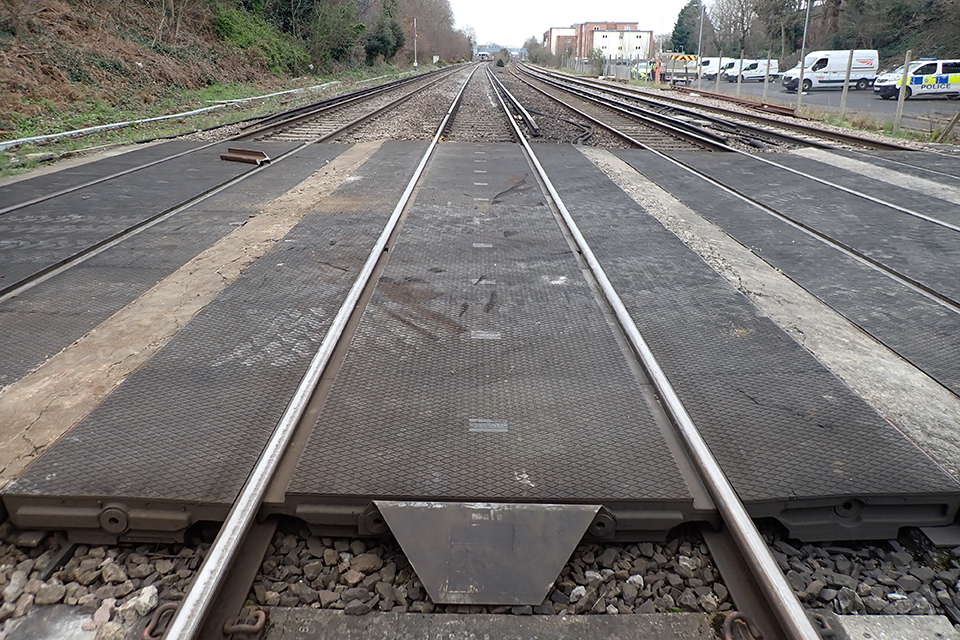Summary
At around 05:40 on Monday 4 March 2024, a passenger train struck a section of redundant rail that had been left foul of the track on the approach to Walton-on- Thames station. At the time of the collision with this rail, the train was travelling at around 85 mph (137 km/h). The front coach derailed, and the train came to a stand around 500 metres beyond the point of derailment.
The redundant rail had inadvertently been left there by a team that had completed work in the area over the previous weekend. Checks undertaken after the work was completed did not identify that a section of redundant rail was in a potentially hazardous position before the railway was handed back for normal operation. This was because no person in charge had supervised the work and because a track handback engineer had not been effectively briefed as to what work had been undertaken before they inspected the track.
RAIB found that the arrangements in place for planning and delivering the work did not effectively manage the risk of a section of rail being left foul of the running line and that the process for inspecting the railway after the work was completed did not provide staff with clear guidance on which areas should be checked. Additionally, the relevant railway rules and standards do not clearly define the roles and responsibilities required to safely deliver work on complex work sites like the one involved in the accident.
Recommendations
As a result of its investigation, RAIB has made two recommendations. The first is addressed to Colas Rail (in consultation with Network Rail), to review its processes related to collecting redundant material when working on or near the line. The second is addressed to Network Rail (in consultation with the Rail Safety and Standards Board) to review the rules and standards relating to how tasks delivered in complex work sites should be co‑ordinated and supervised and to create a coherent process for confirming that the line is safe for the passage of trains after the work is complete.
Additionally, two learning points have been identified. The first reinforces the importance of infrastructure maintainers arranging adequate site lighting. The second concerns the importance of railway organisations ensuring that guidance material relating to superseded standards is removed from resource libraries when new standards are issued.
Andrew Hall, Chief Inspector of Rail Accidents said:
Following a passenger train striking redundant rail on the track in 2018, RAIB issued Urgent Safety Advice to Network Rail regarding safety of the line after engineering work. Since this advice was issued, RAIB has examined a number of further accidents caused by objects, including temporary road-rail access points and a trolley, being left on the track after the completion of maintenance work. These accidents caused damage to the railway infrastructure, the trains involved and resulted in temporary closures to the affected lines. This most recent accident at Walton-on-Thames resulted in a passenger train derailing at speed. Although no one was hurt on this occasion, the train could easily have deviated from the line of the track and struck other trains or objects.
Maintenance work is often carried out at night which makes ensuring the line is subsequently safe for the passage of trains particularly challenging. The risk is very clear. Unfortunately, this accident happened because that risk was not effectively managed. This, following other similar recent incidents, should serve as a stark reminder of the importance of effectively managing the risk of objects being left on the track after overnight maintenance.
Notes to editors
-
The sole purpose of RAIB investigations is to prevent future accidents and incidents and improve railway safety. RAIB does not establish blame, liability or carry out prosecutions.
-
RAIB operates, as far as possible, in an open and transparent manner. While our investigations are completely independent of the railway industry, we do maintain close liaison with railway companies and if we discover matters that may affect the safety of the railway, we make sure that information about them is circulated to the right people as soon as possible, and certainly long before publication of our final report.
-
For media enquiries, please call 01932 440015.













